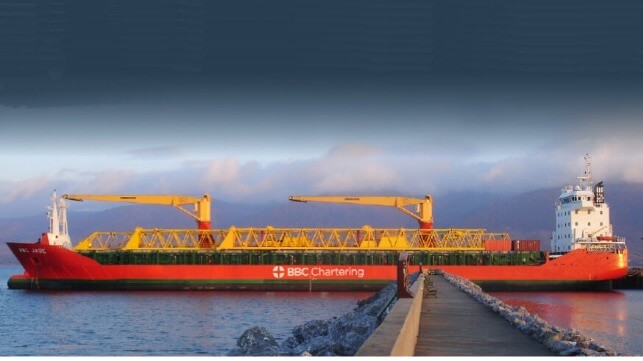Incorrectly Stowed Explosives Get Vessel 90-Day Ban from Australia

The Australian Maritime Safety Authority (AMSA) reports it has issued a safety ban to a vessel after its inspectors found safety violations. The ban from Australian waters is part of the authority’s strict enforcement of safety regulations and efforts at targeting specific operators which the authority believes are not addressing safety concerns.
“AMSA issued the 90-day ban to the Antigua & Barbuda-flagged general cargo ship BBC Jade, after inspectors in Port Alma found 57 tons of explosive substances had been incorrectly stowed on board the vessel during transit,” they wrote announcing the latest enforcement effort. They also noted that it is the third ban from Australian waters issued to the operator Briese Heavylift GmbH & Co for one of its ships this year.
The 12,000 dwt vessel, which was built in 2007, is described by the company as a multipurpose tweendecker. In addition to its cargo holds, it can carry large or heavy cargo on deck.
The vessel’s AIS signal shows that it spent all of last week in Port Alma in Australia arriving on November 12 and departing on November 17. It arrived on a trip from India and Singapore and is now berthed in Nouméa, New Caledonia.
“This is a serious maritime safety issue, as well as a major environmental concern, and not something that should be taken lightly,” said Acting AMSA Executive Director of Operations Evan Boyle. At the same time, he encouraged other Australian companies to exercise due diligence and especially to review the International Maritime Dangerous Goods Code which outlines standards for the transport of dangerous goods including explosives.
The vessel’s previous history appears to show a few issues identified during inspections but no extended detentions. In March 2023, the U.S. Coast Guard cited issues with a worn engine. U.K. inspectors in August noted a missing pilot’s ladder and inoperative radar.
“We take our role as a regulator seriously, and we expect operators to take their obligations seriously, as well,” said Boyle. “We will not hesitate to take tough enforcement action to keep our seas, and seafarers, safe.”
Briese is one of approximately 15 operators that Australia currently has listed for increased inspections. Briese is under review for a year starting in April 2023 with AMSA highlighting that all the company’s ships are eligible for inspection every three months as part of ongoing compliance activities. The authority reported between May 2021 and June 203, one in five of the company’s ships had been detained reporting that this was three times the average for ships visiting Australian waters.
AMSA in June banned another of the company’s vessels, the BBC Weser saying that inspectors found a significant number of ballast air vents were defective. They reported that they had twice prior contacted Breise to warn them of poor performance. Previous issues had included defective emergency generators and what AMSA deemed “unsafe work platforms.” The 17,290 dwt vessel was banned for 90 days and then in July AMSA banned the BBC Pearl (14,400 dwt) for 180 days after reporting inspectors found multiple failures of the safety management system as well as a defective emergency generator and defective fire dampers.
“Australia will not tolerate this ongoing and blatant disregard for maritime safety,” Boyle said.

that matters most
Get the latest maritime news delivered to your inbox daily.
The BBC Jade becomes the eighth ship on which AMSA has issued a ban due to safety issues in 2023. The number of vessels is increasing with by comparison only two bans issued in 2022 and four in 2021.
Other jurisdictions such as the Paris MoU also occasionally issues safety ban for vessels. Last year, there was an effort targeted at expanding safety inspections in part led by the International Transport Workers’ Federation (ITF). Organizations such as the Panama Registry highlighted that the number of inspections however was proportionate to the size of the registry and noted due to the higher average age for the fleet in its registry, it had experienced more detentions while working to purge older and non-compliant vessels for the registry.
